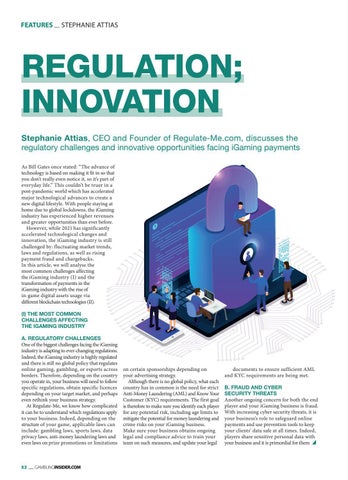FEATURES
STEPHANIE ATTIAS
REGULATION; INNOVATION Stephanie Attias, CEO and Founder of Regulate-Me.com, discusses the regulatory challenges and innovative opportunities facing iGaming payments As Bill Gates once stated: “The advance of technology is based on making it fit in so that you don’t really even notice it, so it’s part of everyday life.” This couldn’t be truer in a post-pandemic world which has accelerated major technological advances to create a new digital lifestyle. With people staying at home due to global lockdowns, the iGaming industry has experienced higher revenues and greater opportunities than ever before. However, while 2021 has significantly accelerated technological changes and innovation, the iGaming industry is still challenged by: fluctuating market trends, laws and regulations, as well as rising payment fraud and chargebacks. In this article, we will analyse the most common challenges affecting the iGaming industry (I) and the transformation of payments in the iGaming industry with the rise of in-game digital assets usage via different blockchain technologies (II). (I) THE MOST COMMON CHALLENGES AFFECTING THE IGAMING INDUSTRY A. REGULATORY CHALLENGES One of the biggest challenges facing the iGaming industry is adapting to ever-changing regulations. Indeed, the iGaming industry is highly regulated and there is still no global policy that regulates online gaming, gambling, or esports across borders. Therefore, depending on the country you operate in, your business will need to follow specific regulations, obtain specific licences depending on your target market, and perhaps even rethink your business strategy. At Regulate-Me, we know how complicated it can be to understand which regulations apply to your business. Indeed, depending on the structure of your game, applicable laws can include: gambling laws, sports laws, data privacy laws, anti-money laundering laws and even laws on prize promotions or limitations
52
GAMBLINGINSIDER.COM
on certain sponsorships depending on your advertising strategy. Although there is no global policy, what each country has in common is the need for strict Anti-Money Laundering (AML) and Know Your Customer (KYC) requirements. The first goal is therefore to make sure you identify each player for any potential risk, including age limits to mitigate the potential for money laundering and crime risks on your iGaming business. Make sure your business obtains ongoing legal and compliance advice to train your team on such measures, and update your legal
documents to ensure sufficient AML and KYC requirements are being met. B. FRAUD AND CYBER SECURITY THREATS Another ongoing concern for both the end player and your iGaming business is fraud. With increasing cyber security threats, it is your business’s role to safeguard online payments and use prevention tools to keep your clients’ data safe at all times. Indeed, players share sensitive personal data with your business and it is primordial for them



















